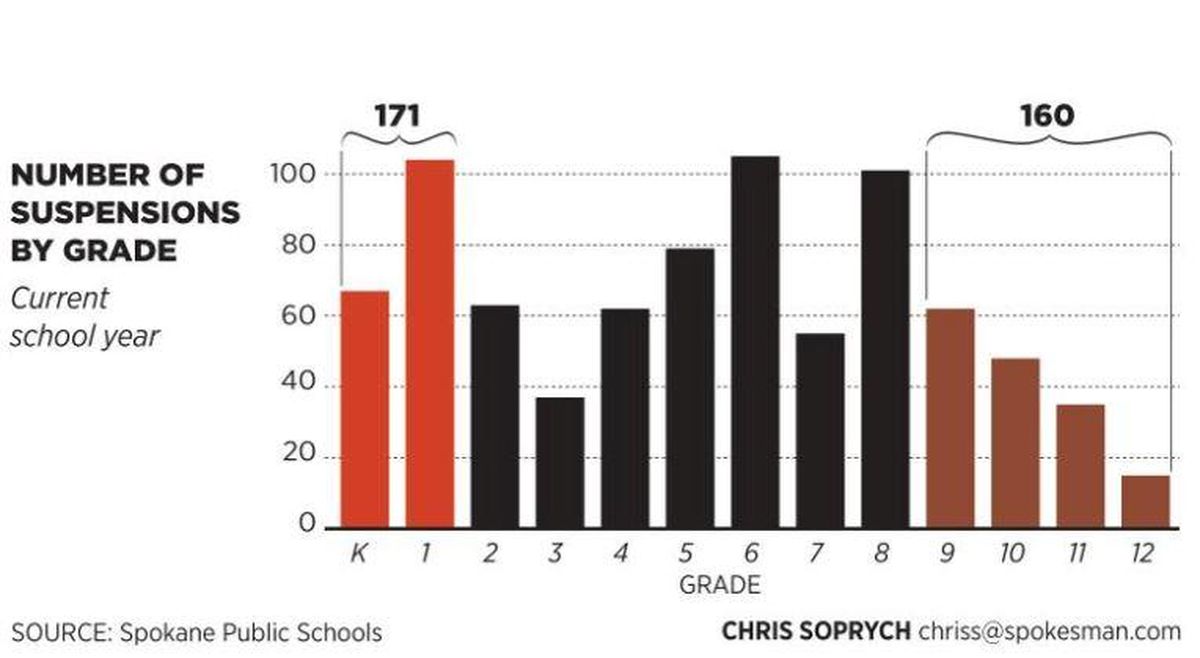Spokane schools suspending first-graders, kindergartners more than high schoolers

She’s an engaged little girl who “tries hard to make friends” despite having a developmental delay that impacts her speech, making her hard to understand. Her name is Jaleesa and she’s on the autism spectrum, her mother says.
In the spring, she was suspended from school for a day and a half for locking herself in a bathroom. She was 5 years old.
“My daughter, she didn’t understand, she could not comprehend,” said Jaleesa’s mother, Amanda Shaw. “I asked them, what is this going to help?”
Jaleesa’s story isn’t an isolated incident.
There have been more kindergarten and first-grade suspensions – 171 – than there have been high school suspensions – 160 – in the first 54 days of the current school year. Districtwide, Spokane Public Schools has reduced suspensions.
Seventy-five kindergarten and first-grade students accounted for the 171 suspensions, while 148 high school students accounted for the 160 high school suspensions.
Special education students continued to be suspended at a disproportionate rate. Although comprising only 12 percent of the district’s student population, those who are considered special education students receive 34 percent of all district suspensions.
“The numbers just seem outrageous when you think of the age,” said Rosey Thurman, an attorney for Team Child, a child and parent advocacy group with an office in Spokane.
There are mitigating factors, Thurman recognizes and district officials say. For one, there are more kindergartners entering the district each year – between 2,400 and 2,500 – than any other grade. Additionally, many of these children are learning how to socialize for the first time.
“When they are very, very upset, it doesn’t matter what their classmates think of them,” said Brian Melody, director of elementary education. “They haven’t had as much practice in needing to self-regulate.”
Jenny Rose, Spokane Education Association president, said she isn’t surprised to see the high rate of suspensions among kindergarten and first-grade students. And while she doesn’t disagree with Melody, she does think the high number of suspensions is indicative of the fact that elementary teachers aren’t receiving enough support.
“I think if we had another adult in the room, I think we would see (suspensions) drastically go down,” Rose said. “I know it would.”
District officials note they have increased staffing. During the last year, they’ve added principal assistants to every school in the district and provided more professional development around restorative justice and discipline. Additionally, every elementary school has either a dedicated counselor or psychologist.
And, overall, the state’s second-largest school district has made substantial gains in reducing suspension and discipline rates.
In 2014-15, 8.5 percent of Spokane Public Schools students were suspended or expelled, according to data submitted to the state. In response to those numbers, the district implemented restorative discipline practices and training, which emphasize communication and keeping students in school. In the summer, the school board changed the district’s discipline policies to reflect that focus.
In an effort to reduce suspension rates, every high school and middle school in the district has an intervention room. Teachers can send misbehaving students to the room, where they are supervised and talked to by a trained educator. This serves as an in-school suspension and allows for some continuity in the educational process.
However, most Spokane elementary schools don’t have these rooms.
When compared to this time last year, high school suspensions have been reduced by 51 percent, middle school suspensions by 52 percent and elementary school suspensions 13 percent.
And to some extent, district spokesman Kevin Morrison said, the district had to start implementing the practices at the high school level first because “those behaviors tend to have higher consequences.”
Still, Rose thinks efforts the district has made, while important, haven’t been enough.
“I mean, the district hired the principal assistants, but that’s really putting a Band-Aid over a dam,” she said.
Vanessa Hernandez, youth policy director for the ACLU of Washington, said Spokane Public Schools has been receptive to changing its discipline practices and has been encouraged by the progress made. However, she said, more is needed.
“The data on elementary level suspensions is quite troubling and very surprising,” she said.
Michaela Jones, a third-grade teacher at Lidgerwood Elementary, said she’s seen a marked difference between this year and last, but more needs to be done, at least at the elementary level.
“Nobody wants to suspend kids,” she said. “But when they can’t be safe, when other students in the classroom can’t be safe, sometimes that’s our only option.”
Jones agreed the transition from home to school can be difficult for many children, causing behavioral outbursts. She said that if another teacher was in the room, these outbursts could be handled on a one-to-one basis instead of resorting to suspensions.
“That’s one of the things they are really emphasizing, having conversations with kids,” she said.
Despite her concerns, Jones did emphasize that the culture around discipline has improved since last year throughout the district.
Nikki Lockwood has two daughters in Spokane Public Schools, one of whom is on the autism spectrum. She said she’s seen a marked improvement in the district’s handling of discipline and receptivity to change over the years.
“I’m really happy to see the suspension and expulsion numbers come down this year,” she said. “That’s really heartening.”
Still, the impact of being suspended, especially at a young age, is long-lasting. Her daughter was suspended in the sixth grade. Lockwood believes her daughter wouldn’t have been suspended if her teachers had more training and support.
“My kid needed it three years ago,” she said of the district’s support. “So it only goes so far.”